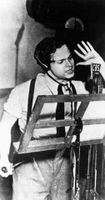 The Spielberg/Cruise War of the Worlds movie has enjoyed a good opening weekend, but its impact is nothing like what happened in 1938.
The Spielberg/Cruise War of the Worlds movie has enjoyed a good opening weekend, but its impact is nothing like what happened in 1938.According to National Geographic News's article "War of the Worlds": Behind the 1938 Radio Show Panic, thousands of people believed they were under attack by Martians:
It was the day before Halloween, October 30, 1938. Henry Brylawski was on his way to pick up his girlfriend at her Adams Morgan apartment in Washington, D.C.As he turned on his car radio, the 25-year-old law student heard some startling news. A huge meteorite had smashed into a New Jersey farm. New York was under attack by Martians.
"I knew it was a hoax," said Brylawski, now 92.
Others were not so sure. When he reached the apartment, Brylawski found his girlfriend's sister, who was living there, "quaking in her boots," as he puts it. "She thought the news was real," he said.
It was not. What radio listeners heard that night was an adaptation, by Orson Welles's Mercury Theater group, of a science fiction novel written 40 years earlier: The War of the Worlds, by H.G. Wells.
However, the radio play, narrated by Orson Welles, had been written and performed to sound like a real news broadcast about an invasion from Mars.
Reportedly, Welles had no idea that his broadcast would result in widespread panic: "According to the New York Times, Welles expressed profound regret that his dramatic efforts could cause consternation. "I don't think we will choose anything like this again," he said. He hesitated about presenting it, Welles said, because "it was our thought that perhaps people might be bored or annoyed at hearing a tale so improbable."
But in 1938, America was rattled by what it was already hearing on the radio and primed for more bad news, no matter how improbable. As The War of the Worlds Invasion: The Historical Perspective explains,
Americans were now able to connect with events and hear their law and opinion makers as never before. A notable trailblazer in this regard was President Franklin D. Roosevelt, whose "fireside chats" (beginning in 1933) brought the voice of government and authority into the home as never before. Major news events also gripped the nation. Bulletins on the hunt for the kidnapped baby son of aviator Charles Lindbergh kept listeners in an agony of suspense over several months in 1932 and in 1936 the war correspondent Hans Von Kaltenborn became the first American reporter to broadcast live from a war zone, when he brought the actual sounds of a Spanish civil war battle into ordinary homes. Equally dramatic was the fatal crash of the airship Hindenburg, recorded on May 6th 1937 by Herbert Morrison of Chicago station WLS, an event that reduced the helpless reporter to tears of frustration and horror. Undoubtedly however, it was the troubling broadcasts from Nazi Germany that did most to unsettle America in this period. During the Munich Crisis of September 12-30th 1938, more radios were sold to anxious Americans than in any previous three-week period, as Hitler rallied his forces and the world slid inexorably toward war.Orson Welles and his colleagues were preparing their broadcast for an unsuspecting nation which was already tense.
- Read the entire Nat'l Geographic News article
- Obtain the 1938 broadcast at the Mercury Theatre on the Air website
- Visit the 2005 movie's web site
- Read H. G. Wells's original novel, from Project Gutenberg
- Enjoy Darkhorse.com's eComic of the novel (in progress now)






 ms.dsk is reading
ms.dsk is reading  Rob Koelling is reading
Rob Koelling is reading  S. Renee Dechert is reading
S. Renee Dechert is reading  Mary Ellen Ibarra-Robinson is reading
Mary Ellen Ibarra-Robinson is reading  Bill Hoagland is reading
Bill Hoagland is reading  Jennifer Sheridan is reading
Jennifer Sheridan is reading  Robyn Glasscock is reading poetry by
Robyn Glasscock is reading poetry by  Susan Watkins is reading
Susan Watkins is reading
1 comment:
Hi,
Thanks for the link to my site - it has since had a major update with many new interesting features, including more on War Of The Worlds radio broadcasts in other countries.
The link to my site you have has changed however to:
http://www.war-ofthe-worlds.co.uk/war_worlds_orson_welles_mercury.htm
Post a Comment